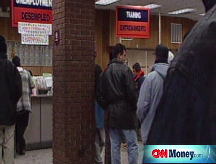Where the jobs are - still
Yeah, times are hard. But the executive job outlook for 2009 presents a few pockets of opportunity, especially in accounting, engineering and health care.
|
||
| How safe is your job? Take this quiz to size up your chances of being fired. Good luck. 1. Have you ratcheted up your career skills? Have you learned something new in the past 90 days (mastery of a piece of software, an accounting formula, a foreign language, etc.)? Yes No |
(Fortune) -- Friends, let's not sugarcoat it: This is an exceptionally lousy time to be looking for a job. We've all heard by now (repeatedly) that about 2 million of them vanished in 2008, more than 250,000 in the financial sector alone, and that hiring at most companies has slowed to a crawl or stopped altogether.
But don't give up. If you happen to belong to the broad category of employees the Bureau of Labor Statistics identifies as "management, business, and financial occupations" - a group that includes white-collar folk whose titles range from office manager to CEO - there may well be a job opening out there somewhere with your name on it.
That's partly because grim reports about mounting unemployment usually neglect to mention that job losses don't fall equally across all categories of workers. The overall unemployment rate, now at 7.2%, includes people of all ages and occupations. But joblessness tends to be more widespread among very young workers, no matter what the economy is doing, points out Karen Kosanovich, an economist at the BLS. If you look only at Americans aged 25 or older, the rate is 6%. Narrow it to only people with four-year college degrees, and the unemployment rate is 3.3%. That's much higher than it was in 2006 and 2007, when unemployment among college grads hovered around 2%, but it's still far below the 7.2% national average.
(Conversely, unemployment rates among construction workers and factory employees are much higher than average, at 13% and 10% respectively.)
Moreover, notes Jonas Prising, president of staffing giant Manpower North America (www.manpower.com), "Some of the 'job cuts' announced in late 2008, especially by very large companies, included normal attrition like retirements, plus a certain amount of deciding simply to leave some unfilled positions open for now. So that widely cited figure of 2 million job losses is not all involuntary layoffs, which makes it far less scary than it sounds."
Another bit of reassuring news for high-end job seekers: Recruiters were more optimistic at the end of December than they had been just a month before. ExecuNet (www.execunet.com), a job board and career network for $100,000-a-year-plus executives, has polled headhunters every month since 2003, asking whether they expect searches to increase or decline in the months ahead. December's survey showed that 40% were already seeing some signs of rising demand for management talent, up from 26% in November.
At the same time, TheLadders.com, another job board for managers in the $100,000-a-year-and-up category, reported that more than 400 employers and recruiters signed on in the last three months of the year, looking to hire executives. "It's critical for job seekers to keep a sense of perspective about the downturn, because there are still companies hiring," says TheLadders.com president Alexandre Douzet.
It also helps to be willing to move. 63% of the managers in the latest survey said they would relocate for a new job, versus 55% in late 2007, Douzet notes. TheLadders.com researchers looked at 10 metropolitan areas around the U.S. and found that out-of-work executives have the best chance of getting a new job in Washington, D.C., and San Francisco, two cities where the ratio of candidates to openings is lowest (3-to-1). Boston has a job seeker-to-job ratio of 5-to-1; Philadelphia and New York are slightly tougher at 6-to-1; and Chicago, Austin, and Los Angeles are the most crowded (hence most competitive) executive job markets, with 7-to-1 ratios.
For instance, the financial industry is struggling, but TheLadders.com is seeing a surge of interest among technology and health-care companies in hiring Wall Street pros with backgrounds in quantitative analysis, because these employers need people who can oversee the sophisticated modeling and metrics systems they're building into their operations. Demand is also up for all kinds of accounting specialties, like forensic accounting and risk management.
And "green" jobs are on the rise: The number of job postings at TheLadders.com requiring an environmental-planning or engineering background has gone up about 25% over the past year, and Douzet expects that trend to accelerate by midyear.
"There's a tremendous passion around 'green' technology," agrees Brian Sullivan, CEO of global executive search firm CTPartners (www.ctnet.com).
He says private-equity firms and energy companies are looking for managers with the right engineering know-how to run things like wind farms: "In the short run, companies are hiring senior project managers for eco-engineering initiatives. Eventually, opportunities in those areas will trickle down to the rank and file."
Health-care companies in general are growing and hiring -- especially the pharmaceutical industry, which is making lots of money and reinvesting it in research and development, Sullivan says. (Pfizer, however, announced Tuesday that it's laying off as much as 8% of its R&D staff -- up to 800 jobs -- to raise productivity.) "We're also seeing a jump in demand for executives who are experts in restructuring or turnaround situations, as well as ... bankruptcy attorneys," he says.
Sullivan adds that executives interested in serving on a board of directors may now get the chance. "Lots of CEOs are resigning from board seats now because they can't put in the time required. They're too busy trying to steer their own companies through the crisis," he says. "So the need for corporate directors is rising as the supply falls."
Of course, not everybody has the right background for a job in accounting, engineering, or health care -- although it is often possible, if never easy, to make the leap to a different industry. (For a few pointers, see "How to jumpstart a new career," Ask Annie, October 20, 2008.)
But if you just can't land the position you really want in the next six months or so, and end up taking some other job as a stopgap, don't despair. "The reality this recession is masking is that companies in every industry are going to need talent in order to be ready for an economic recovery," says Jonas Prising at Manpower. "That's especially true because the aging of the workforce is going to lead to an exodus of senior managers before long. So to some degree, it is a waiting game."
"2009 will be an interesting year - and we've all set our expectations so low, it could turn out to be a surprisingly good one," Prising adds. Here's hoping.
Readers, what do you say? Are there pockets of opportunity, in your city or your industry, where companies are still hiring? Have you recently gotten a new job despite the tough overall job market? If so, do you have any suggestions for job hunters? Post your thoughts on the Ask Annie blog. ![]()
-
 The retail giant tops the Fortune 500 for the second year in a row. Who else made the list? More
The retail giant tops the Fortune 500 for the second year in a row. Who else made the list? More -
 This group of companies is all about social networking to connect with their customers. More
This group of companies is all about social networking to connect with their customers. More -
 The fight over the cholesterol medication is keeping a generic version from hitting the market. More
The fight over the cholesterol medication is keeping a generic version from hitting the market. More -
 Bin Laden may be dead, but the terrorist group he led doesn't need his money. More
Bin Laden may be dead, but the terrorist group he led doesn't need his money. More -
 U.S. real estate might be a mess, but in other parts of the world, home prices are jumping. More
U.S. real estate might be a mess, but in other parts of the world, home prices are jumping. More -
 Libya's output is a fraction of global production, but it's crucial to the nation's economy. More
Libya's output is a fraction of global production, but it's crucial to the nation's economy. More -
 Once rates start to rise, things could get ugly fast for our neighbors to the north. More
Once rates start to rise, things could get ugly fast for our neighbors to the north. More










